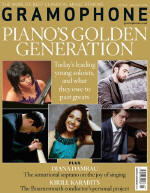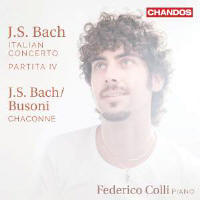Texte paru dans: / Appeared in: |
|
|
Outil de traduction (Très approximatif) |
|
|
Reviewer: Harriet Smith My last encounter with Federico Colli was a slightly frustrating one, with his readings of Scarlatti at times seeming overly interventionist. But what shines through this new Bach disc is a sense of musical daring; imagination, too; and sincerity by the bucketful, not just at the keyboard but also in his soul-baring notes. He brings to the Ouverture of the Fourth Partita a compelling sense of grandeur, while the fast writing combines buoyancy with absolute clarity in the counterpoint, with myriad shifts of dynamics and phrasing. Those shifts are something of a Colli trademark and where they work well, as here, they can be very striking. But in places he can sound a little contrived – the Allemande, for instance, in which it seems as if every phrase is given a different tinta, an effect taken to further extremes in the repeats, and the Menuet, which sounds merely mannered. But the Aria is charming, if not quite conjuring the otherworldly intimacy of Richard Goode or the sublime simplicity of Murray Perahia. The Sarabande is a highlight on this new recording, full of iridescent beauty. And Colli’s revealing of the inner working of the Gigue is utterly compelling. The Italian Concerto suits him well – the easy virtuosity of the first movement is full of interest, while the finale abounds in fascinating touches and avoids becoming a mere speedfest. In between, he gives a rapturous account of the Andante. He ends with the mighty Bach/Busoni Chaconne. This is again full of Colli fingerprints – an ability to withdraw the sound to a mere whisper, the sense of constantly experimenting with textures and phrasing, sometimes resulting in losing the wood for the trees. Busoni once wrote of wanting to remove, in his transcriptions, ‘the dust of tradition … I try to restore them to their youth’. In Colli’s hands there’s occasionally a danger that the original becomes entirely unrecognisable: to my mind, central to this reworking of the Chaconne is Busoni’s grandeur of vision, a quality that sometimes gets lost in the excitement of the moment. The drama is contained within the score itself, yet Colli sometimes adds to it needlessly, creating something overly Romantic. That said, there are many ravishing and compelling moments in his reading, and he has not only an epic technique but boundless imagination too. Just occasionally, though, I wanted him to rein things in a little Nevertheless, there’s no doubt that Colli is one of the more original thinkers of his generation. |
|




